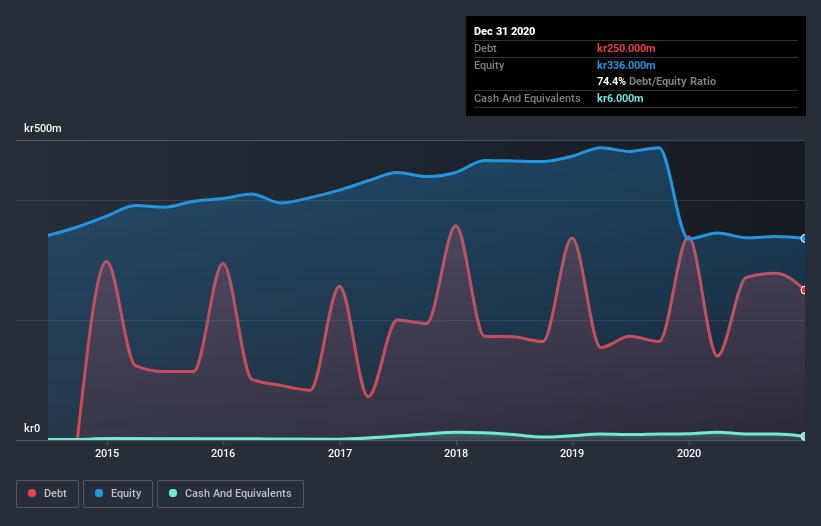
Warren Buffett famously said, 'Volatility is far from synonymous with risk.' When we think about how risky a company is, we always like to look at its use of debt, since debt overload can lead to ruin. As with many other companies AGES Industri AB (publ) (STO:AGES B) makes use of debt. But should shareholders be worried about its use of debt?
When Is Debt A Problem?
Generally speaking, debt only becomes a real problem when a company can't easily pay it off, either by raising capital or with its own cash flow. In the worst case scenario, a company can go bankrupt if it cannot pay its creditors. While that is not too common, we often do see indebted companies permanently diluting shareholders because lenders force them to raise capital at a distressed price. By replacing dilution, though, debt can be an extremely good tool for businesses that need capital to invest in growth at high rates of return. When we examine debt levels, we first consider both cash and debt levels, together.
Check out our latest analysis for AGES Industri
How Much Debt Does AGES Industri Carry?
The image below, which you can click on for greater detail, shows that AGES Industri had debt of kr231.2m at the end of December 2020, a reduction from kr338.5m over a year. On the flip side, it has kr6.00m in cash leading to net debt of about kr225.2m.

How Healthy Is AGES Industri's Balance Sheet?
We can see from the most recent balance sheet that AGES Industri had liabilities of kr364.0m falling due within a year, and liabilities of kr167.0m due beyond that. Offsetting this, it had kr6.00m in cash and kr137.0m in receivables that were due within 12 months. So its liabilities total kr388.0m more than the combination of its cash and short-term receivables.
When you consider that this deficiency exceeds the company's kr385.2m market capitalization, you might well be inclined to review the balance sheet intently. Hypothetically, extremely heavy dilution would be required if the company were forced to pay down its liabilities by raising capital at the current share price. There's no doubt that we learn most about debt from the balance sheet. But it is AGES Industri's earnings that will influence how the balance sheet holds up in the future. So when considering debt, it's definitely worth looking at the earnings trend. Click here for an interactive snapshot.
Over 12 months, AGES Industri made a loss at the EBIT level, and saw its revenue drop to kr814m, which is a fall of 19%. We would much prefer see growth.
Caveat Emptor
Not only did AGES Industri's revenue slip over the last twelve months, but it also produced negative earnings before interest and tax (EBIT). Indeed, it lost kr2.1m at the EBIT level. When we look at that alongside the significant liabilities, we're not particularly confident about the company. It would need to improve its operations quickly for us to be interested in it. On the bright side, we note that trailing twelve month EBIT is worse than the free cash flow of kr103m and the profit of kr1.0m. So there is definitely a chance that it can improve things in the next few years. When analysing debt levels, the balance sheet is the obvious place to start. But ultimately, every company can contain risks that exist outside of the balance sheet. For example AGES Industri has 4 warning signs (and 1 which can't be ignored) we think you should know about.
If, after all that, you're more interested in a fast growing company with a rock-solid balance sheet, then check out our list of net cash growth stocks without delay.
If you decide to trade AGES Industri, use the lowest-cost* platform that is rated #1 Overall by Barron’s, Interactive Brokers. Trade stocks, options, futures, forex, bonds and funds on 135 markets, all from a single integrated account. Promoted
New: Manage All Your Stock Portfolios in One Place
We've created the ultimate portfolio companion for stock investors, and it's free.
• Connect an unlimited number of Portfolios and see your total in one currency
• Be alerted to new Warning Signs or Risks via email or mobile
• Track the Fair Value of your stocks
This article by Simply Wall St is general in nature. It does not constitute a recommendation to buy or sell any stock, and does not take account of your objectives, or your financial situation. We aim to bring you long-term focused analysis driven by fundamental data. Note that our analysis may not factor in the latest price-sensitive company announcements or qualitative material. Simply Wall St has no position in any stocks mentioned.
*Interactive Brokers Rated Lowest Cost Broker by StockBrokers.com Annual Online Review 2020
Have feedback on this article? Concerned about the content? Get in touch with us directly. Alternatively, email editorial-team (at) simplywallst.com.
About OM:AGES B
AGES Industri
Engages in the die casting, machining, tooling, welding, and assembly of precision components.
Flawless balance sheet and fair value.
Market Insights
Community Narratives



